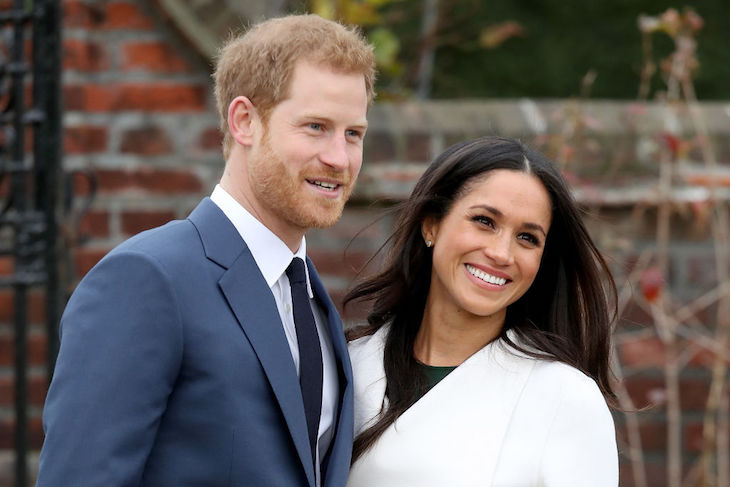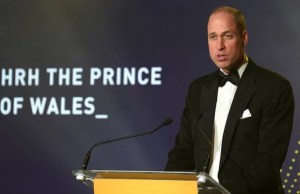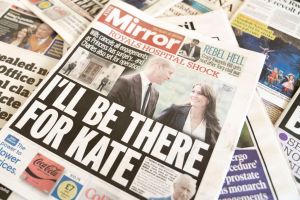Prince Harry’s imminent wedding to Meghan Markle will reinvigorate the dying special relationship between Britain and America. It is a boost for the fading American regard for the monarchy.
In America, the mother country is increasingly the forgotten country – and it has been fading for a century, ever since the First World War. As Sellar and Yeatman put it in 1066 and All That, after the allied victory ‘America was thus clearly top nation, and History came to a full stop’.
As the increasingly weaker party in the 242-year affair, we cherish the special relationship much more than the dominant partner. That great Anglo-American WH Auden – an exile to New York, born in York – got it right: ‘If equal affection cannot be, let the more loving one be me’.
That was the state of the affair 12 years ago, when I was New York correspondent for the Daily Telegraph: my love for America wasn’t entirely reciprocated. Despite Tony Blair’s craven support of George W Bush, the British weren’t considered a major international player. The proportion of Americans with British ancestors was in steep decline. And I never once heard that hallowed phrase, ‘I so love your accent’.
I’d been brought up on the idea that America was a country of Anglophiles, of doe-eyed cheerleaders who went weak at the knees when you did a passable impression of Hugh Grant. No longer. Yes, there was the odd constitutional historian in a bowtie who cross-questioned me about the Glorious Revolution. And a charmingly polite miner in Sago, West Virginia, asked me if I knew the Queen while I remorselessly interrogated him about a close friend who’d just been killed in a mining disaster. But these were small islands of Anglophilia in a country whose eyes were turning from Britain and Europe towards China and the East.
The Atlantic has only grown wider since then. Last autumn, Jeremy Shapiro, an adviser on Europe to the State Department under Barack Obama, said the special relationship between Britain and America was ‘unrequited’. The State Department was careful to emphasise the special relationship in every press conference involving the British, said Shapiro, but, behind the scenes, they laughed at the idea.
The ironic thing is that Donald Trump – the most loathed President in Britain in the modern era – is also the most Anglophile. He is the first President to have a parent born in Britain – his mother, Mary Anne MacLeod, was born on the Hebridean island of Lewis – since Woodrow Wilson was in office a century ago. Wilson’s mother, Jessie Woodrow, was born in Carlisle. But, with a state visit from Trump on semi-permanent hold, and British derision of the President unrelenting, his affection for his literal mother country is in freefall.
And then along comes a magic weapon: Meghan Markle – the best thing for the special relationship since Winston Churchill, the son of Brooklyn girl Jennie Jerome.
Meghan is tailor-made to revive interest in the special relationship, a walking incarnation of the long-term links between Britain and America. On her father’s side, she’s related to Jane Seymour, Henry VIII’s third wife, and descended from Edward III and Captain Christopher Hussey, a 17th-century founder of Nantucket, Massachusetts.
A Protestant educated at a Catholic school, she neatly marries the two faiths of a millennium’s worth of English monarchs. Even her Welsh name is ideally suited to her new husband, Prince Henry of Wales.
On her mother’s side, she reflects America’s more recent history: Meghan’s great-great-great-great-great grandfather was a slave in Georgia’s cotton plantations, emancipated at the end of the Civil War.
The dwindling Anglophile core of America – those New York constitutional historians and West Virginia miners – would have been interested in Prince Harry’s wedding anyway. Meghan Markle brings much of the rest of America – the majority of the population, indifferent to colonial history – back within the orbit of Britain and the monarchy.
Meghan’s most effective superpower is her celebrity. The internet in general, and social media in particular, have diminished interest in the past and the outside world, and concentrated it on the now and the self. And they have massively increased the power of modern fame.
It doesn’t really matter that Suits – the legal drama that was Meghan’s career high point – was never a mainstream hit here. The point is that she belonged to the most influential, famous tribe in the world – good-looking actors; what’s more, good-looking actors in long-form, cable and online TV, now the fastest growing type of screen entertainment, as Hollywood and the traditional networks go into decline.
Prince Harry, too, is purpose-built for an American audience. Not just royal, young and good-looking, he is locked into two of America’s holiest causes: the army – Harry served as an officer for a decade; and armed forces veterans – of the three Invictus Games Harry set up for the injured armed forces, serving and retired, two have been held in North America, in Florida and Toronto.
It helps, too, that Harry and Meghan have both – like characters in an American TV drama, in fact – been on a journey. She is the child of divorced parents, and is a divorcée herself. He is not only the child of divorced parents, but his mother was the tragic victim of the most famous, doomed fairytale in living memory. And, for all the difference in their backgrounds, Harry and Meghan speak the same modern language of caring, sharing, gender-equal, new age eco-philosophy.
They have, accidentally, pulled off an extraordinary double-whammy. They can enjoy all the traditional trappings of royalty – palaces, jetset holidays and, in one of Meghan’s engagement pictures, a £56,000 dress. And yet, at the same time, because of their fractured childhoods, and their caring modernspeak, they are considered understanding and empathetic; one of us, even though they most patently aren’t.
These days, even America’s Founding Fathers – still revered a decade ago, when I was in New York – are under fire. Thomas Jefferson and George Washington are abused for owning slaves; even a statue of Christopher Columbus in Central Park was vandalised in September, as a wicked symbol of colonisation.
Prince Harry and Meghan may have dated strains of colonial America, royal Britain and the special relationship flowing through their veins. But their celebrity, good looks and impeccably modern behaviour have washed away the supposed sins of the past, and boosted the fortunes of an ancient monarchy in the New World.


















